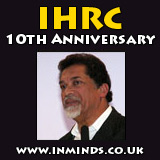
 Innovative Minds © 2014. All Rights Reserved. www.inminds.co.uk | ||||
Should we consider a boycott of Israeli academic institutions? YesTom Hickey, British Medical Journal
As the motion's mover, I have been subjected to sustained vilification. Eminent American professors, and supporters of Israel, have threatened to bankrupt and to destroy the careers of any union members who support a boycott.
Tom Hickey, University and Colleges Union The proposal adopted by the University and Colleges Union congress to discuss whether it should boycott Israeli academic institutions has caused a furore. The House of Lords set aside time for a full debate, and the British government dispatched a minister to reassure its Israeli counterparts. Whole page advertisements rapidly appeared in national newspapers condemning the decision. The great and the good were mobilised. Irrational, one sided, anti-semitic, and counterproductive were some of the accusations levelled against us for deciding to debate. As the motion's mover, I have been subjected to sustained vilification. Eminent American professors, and supporters of Israel, have threatened to bankrupt and to destroy the careers of any union members who support a boycott. The conflation of a boycott proposal and a proposal to debate the appropriateness of a boycott clearly serves the purpose of those who wish to deflect attention from the substantive issue: the plight of people suffering under occupation.
There is strong evidence of the complicity of Israeli academic institutions [in the occupation]. No Israeli college or university has publicly condemned what is being done in the Occupied Territories in the name of every Israeli citizen. Some Israeli educational institutions have established campuses for settlers on illegally confiscated land; others conduct archaeological digs on land from which Palestinian farmers have been expelled.
So why has the union brought this predictable condemnation down on its head? Delegates decided that we could not ignore what is being done in the Occupied Territories, or the systematic denial of educational opportunities and academic freedom to Palestinian students and scholars. Some BMA members have also expressed concern about the complicity of the Israeli Medical Association in the occupation.[1] OccupationThe territories, occupied since 1967, have been colonised by Israeli settlements built on illegally confiscated land. The area has been disaggregated and rendered ungovernable by road networks for Israeli use only. Houses are demolished as collective punishments, and there is regular shooting and shelling. Farmers are separated from their land, and the supply of water sharply discriminates between the needs of Palestinians and those of Israeli settlers. In these circumstances, there can be no normal educational provision. Tutors and students face delays, harassment, and humiliation at checkpoints, visa and travel restrictions, and enormous problems of infrastructural decay and underfunding. Work for most inhabitants is all but non-existent, and 46% of the population is suffering from or vulnerable to food insecurity.[2] Academic institutions
Academic freedom is not an absolute value taking precedence over all else. The values of human life and dignity are the ultimate objectives, and sometimes these may not be entirely compatible with the principle of untrammelled academic freedom.
In all of this, there is strong evidence of the complicity of Israeli academic institutions.[3] No Israeli college or university has publicly condemned what is being done in the Occupied Territories in the name of every Israeli citizen. Some Israeli educational institutions have established campuses for settlers on illegally confiscated land; others conduct archaeological digs on land from which Palestinian farmers have been expelled. Some Israeli colleagues have spoken out against the occupation. But these are the heroic few. They risk their professional careers and being ostracised. Our boycott debate is accused of infringing academic freedom. It does so, and that is to be regretted. The pursuit of scientific and artistic advance without hindrance is indeed crucial for human improvement. But academic freedom is not an absolute value taking precedence over all else. The values of human life and dignity are the ultimate objectives, and sometimes these may not be entirely compatible with the principle of untrammelled academic freedom. We are also accused, hypocritically, of interfering with free speech. But it is our opponents who are trying to prevent such a debate from taking place. Unfair to Israel?
Accusing those who criticise Israel of being anti-semites presumes an identity of interests between Israel and all Jewish people, wherever they may be. This is illogical and contrary to the facts. Most people who spoke in favour of the motion at the our congress are Jewish..
We are accused of unfairly singling out Israelâthe Jewish stateâand hence of being anti-semites. We are asked why we do not propose a boycott of other states whose policies are barbaric and inhuman, such as China, Saudi Arabia, Iran, or Zimbabwe. But whether a boycott is appropriate in such places depends on the merits of each individual case. In the case of Israel, we are speaking about a society whose dominant self image is one of a bastion of civilisation in a sea of medieval reaction. And we are speaking of a culture, both in Israel and in the long history of the Jewish diaspora, in which education and scholarship are held in high regard. That is why an academic boycott might have a desirable political effect in Israel, an effect that might not be expected elsewhere. Anti-semitism?The accusation of anti-semitism is both absurd and offensive. Accusing those who criticise Israel of being anti-semites presumes an identity of interests between Israel and all Jewish people, wherever they may be. This is illogical and contrary to the facts. Most people who spoke in favour of the motion at the our congress are Jewish, as are the members of the British Committee for the Universities of Palestine. The response of Israel's defenders is to say that such people are not proper Jewsâthat they are "self-hating Jews." Jewishness thus becomes transformed from a cultural or religious identity into an ideological position. Boycott
If Israeli academic institutions are complicit in the inhuman and dehumanising treatment of the Palestinians in the Occupied Territories, doing nothing (or nothing effective), would also make us complicit, if only by default. We cannot turn away and say, "Business as usual."
Tom Hickey, University and Colleges Union The result of the debate in our union may not be a decision to boycott. If that is the outcome, however, it will not be because most members are unconcerned about the plight of the Palestinians. It would be because an alternative, and equally effective, proposal for their aid and support, and for opposition to the policies of the Israeli state, had emerged. Moreover, the boycott would be of Israeli academic institutions only. We would not sever links with our Israeli colleagues, which would be counterproductive. Individual and group collaboration and publication on joint projects could continue, as long as such projects were not formally sponsored by Israeli institutions. The fundamental issue is not a boycott as an end in itself. It is how to raise the current outrages to national and international prominence. Whether an institutional boycott is the most appropriate tactic will remain an open question. What is not, and cannot be, open is whether it is appropriate to debate and discuss the pros and cons of the tactic. If Israeli academic institutions are complicit in the inhuman and dehumanising treatment of the Palestinians in the Occupied Territories, doing nothing (or nothing effective), would also make us complicit, if only by default. We cannot turn away and say, "Business as usual."
References [1]Summerfield D, Green C, Karmi G, Halpin D, Cutting P, et al . Israeli boycotts: gesture politics or a moral imperative? Guardian 2007 Apr 21. [2]World Food Programme. Projected 2007 needs for WFP projects and operations. Occupied Palestinian Territory. [3]British Committee for the Universities of Palestine. Why boycott Israeli universities? London: BRICUP, 2007.
Source: http://www.bmj.com/cgi/content/full/335/7611/124 Also Of InterestPage URL: http://www.inminds.co.uk/article.php?id=10178
|
|
Support Us
If you agree with our work then please support us.Campaigns INMINDS Facebook Live Feed Latest Video's
INMINDS Twitter Feed Tweets by @InmindsComFeatured Video's
You need Flash player 8+ and JavaScript enabled to view this video.
[all videos (over 200)..] Featured MP3 Podcast  "Prisoners of Faith and the faith of prisoners rotates around three important concepts. One is subber or patience, the second one is sacrifice because one cannot have patience if you are not prepared to sacrifice, and thirdly the concept of shahadah or martyrdom because if we have not been taught how to face failure then our lives become difficult, if we have not been taught how to face suffering our lives become even more difficult, and if we are not taught how to face death our lives are utterly miserable when it happens to us or to those close us.." Veteran of the armed struggle against apartheid in South Africa, he was one of the youngest people to be imprisoned on Robben Island. Islamic Human Rights Commission 10th Anniv. Nov 2007 [19min / 8Mb] [all podcasts..] Newsletter Feedback |
 |
 |















































